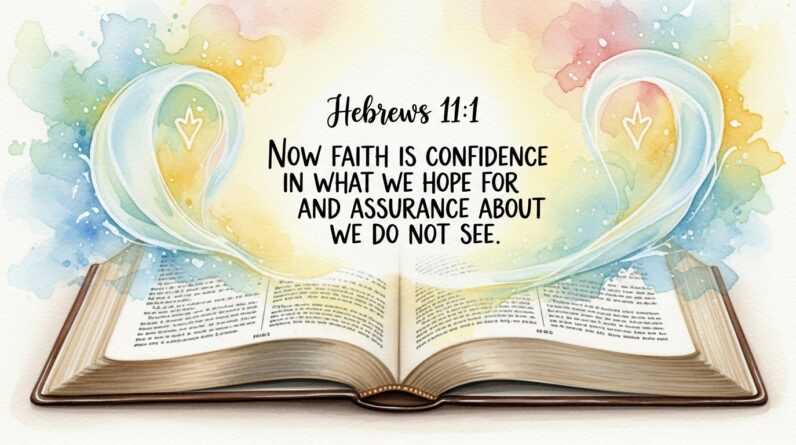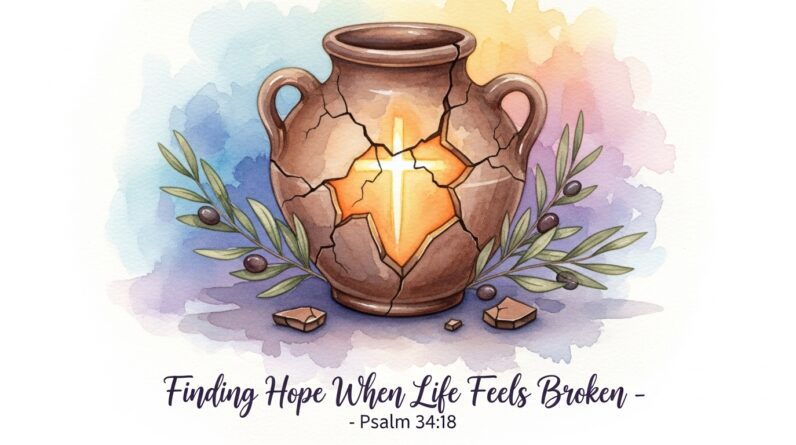Restoring Hope When You Feel Forgotten By God

You’ve felt it before—an ache that whisperingly says God has forgotten you. It shows up in long seasons of silence, unanswered prayers, disappointments that pile up, or in the quiet moments when your heart reveals how alone you feel. When you face that hollow question—Where is God in all this?—you aren’t alone. This article is meant to walk with you and help you restore hope. Not as a quick pep talk, but as a companionable exploration of biblical truth, practical steps, and gentle spiritual practices that can reorient your heart toward God’s presence even when He feels distant.
This is written in second person because this is about your journey. You’ll find Scripture woven through, practical suggestions to put into motion, and reflective questions to help you process your feelings. The goal is to encourage you, not to dismiss your pain. You are seen, and there is a pathway to restore hope.
Why you feel forgotten by God
You aren’t imagining things when you feel forgotten; your emotions are real, and they usually reflect specific experiences—loss, ongoing difficulty, betrayal, or seasons where prayers seem to hit a ceiling. Sometimes the feeling grows out of unmet expectations: you prayed for a job, for healing, for a relationship, and nothing changed. When life’s timelines don’t match yours, it can feel like God’s schedule is off or that He’s chosen not to act. That feeling is painful and can seep into your worship, your trust, and even your identity.
Scripture acknowledges seasons of felt abandonment. For example, when David poured out lament, he described feelings of being forgotten and alone. That honesty in Scripture gives you permission to bring the same rawness before God. The Bible is full of people who felt forsaken yet found restoration—not because they pretended to be okay, but because they leaned into God’s promises and presence even amid silence.
Understanding what “forgotten” really means

When you say you feel forgotten, what you often mean is that the intimacy and awareness you once felt with God have dimmed. You might not mean that God literally has forgotten you—after all, Scripture insists on God’s attentive love—but the felt reality of His presence may have faded. That distinction matters because it opens a doorway. If God’s character hasn’t changed, then your felt distance is something that can be addressed, understood, and healed.
Consider the promise in Isaiah 49:15-16, which asks whether a mother could forget her child, then answers with a strong no: God has engraved you on the palms of His hands. That image helps you remember that your identity and worth are not dependent on your immediate feelings. God’s memory of you is active; your work is to find ways to restore hope in the midst of felt silence.
Biblical truths that help restore hope
The Bible doesn’t ignore human despair. Instead, it frames it within God’s unchanging nature. When you feel forgotten, you can anchor yourself in several biblical truths that help restore hope.
- God’s presence is constant, even when you cannot sense it. Christ’s promise in Matthew 28:20 says, “I am with you always.” That promise does not depend on your feelings.
- God will not abandon you; even in exile and calamity, He is present. The writer of Hebrews echoes this in Hebrews 13:5, saying that God will never leave you nor forsake you.
- Your pain is known and entered into. Psalmists, prophets, and apostles model lament—bringing honest emotion to God—and yet find restoration in relationship.
These truths are not easy platitudes. They are the scaffolding for rebuilding faith when the emotional scaffolding feels unstable. Keep returning to them as you take small steps to restore hope.
How honest lament helps you heal
Lament is a spiritual practice that permits you to tell God exactly how you feel—anger, confusion, abandonment—without pretending everything is okay. There’s a biblical pattern for this. Many Psalms are laments; David and others poured their complaints and their heartbreaks out before God, asking questions and demanding answers. This practice doesn’t weaken faith—it purifies it. By bringing your honest pain to God, you are acknowledging your dependence and trusting that truth can stand the light.
Lament often follows a structure: address God, describe the pain, request help, and then express trust or hope. You can use those simple steps in your own voice to restore hope: bring the hurt, ask for clarity, and remind yourself of God’s past faithfulness.
Practical spiritual practices to restore hope

Restoring hope rarely happens in one grand movement; it’s more often a series of small, intentional steps. Here are practical spiritual practices that can recalibrate your heart toward God’s nearness.
First, pray honestly. You don’t need polished words. Speak to God in the raw language of your heart. Second, reread promises in Scripture that you can cling to—verses that speak of God’s faithfulness, presence, and love. Third, create rhythms: daily short prayers, weekly Sabbath practices, and monthly reflections. Rhythms stabilize your heart when feelings wobble.
Fourth, keep a repentance-and-gratitude journal. Writing down where you’ve felt distant, where you’ve seen God act, and where you need forgiveness helps create a map of God’s work in your life. This map is a tangible way to restore hope when memory feels foggy.
Finally, engage with the community. Vulnerability with trusted friends, a spiritual director, or a pastoral caregiver can reorient you when loneliness amplifies your sense of being forgotten.
Scripture you can read when you want to restore hope
Deliberately reading particular passages can anchor your heart. When you want to restore hope, turn to Scriptures that recount God’s presence in the midst of despair and His power to restore.
- Psalm 23:1–6 — Reminds you that God is your shepherd, guiding and restoring even through the valley.
- Psalm 34:18 — “The Lord is close to the brokenhearted.”
- Romans 8:38–39 — Nothing can separate you from God’s love.
- Jeremiah 29:11 — A reminder of God’s plans for your future.
Reading these passages slowly—perhaps aloud—can help you internalize truth when feelings shout otherwise. Meditate on a verse for a few days until it becomes a lifeline. Let Scripture be the counterweight to the lies your emotions may tell.
The role of memory in restoring hope
You restore hope by remembering. Memory is a spiritual discipline. When you intentionally recall ways God has been faithful—moments of provision, answered prayers, times of comfort—you create a portfolio of evidence that God is trustworthy. That portfolio doesn’t erase pain, but it strengthens your capacity to trust amid uncertainty.
Make a habit of recording answered prayers, milestones, and small mercies. Review them when discouragement creeps in. Over time, you’ll have a tangible narrative of God’s presence that counters the narrative of abandonment.
When doubt and questioning are part of your faith

Doubt doesn’t mean failure. It’s often an invitation to a deeper, more honest faith. When you feel forgotten, your first instinct might be to hide your doubts. But Scripture models bringing doubts to God and to trusted companions. Thomas questioned Jesus, and Jesus met him tenderly and gently. You can bring your questions without fear of judgment.
Engage your doubts by asking: What assumption is behind this doubt? Is this a theological doubt, an emotional reaction, or a response to a life event? Let trusted mentors, pastors, and Scripture help you process. Doubt can become a door to deeper maturity and can be an instrument the Holy Spirit uses to restore hope.
Real biblical stories of people who felt forgotten
Scripture doesn’t hide the failures or doubts of God’s people. You can learn from them:
- Hagar (Genesis 21) felt abandoned in the desert, yet God met her and promised that her child would become a great nation. See Genesis 21:17–19.
- Elijah, after a mountaintop victory, fled in fear and asked God to take his life—he felt utterly alone. God met him with rest, food, and a gentle voice in 1 Kings 19:4–13.
- Job’s friends suggested that his suffering meant God had abandoned or punished him, but Job’s honest lament grew into a raw dialogue that ultimately resulted in restoration. Read Job 42:10.
These stories show you that feeling forgotten has often preceded restoration. They remind you that God sometimes meets people not by blasting away their problems instantly but by walking with them through the valley—refining, restoring, and revealing Himself in small, steady ways.
Practical steps to restore hope in daily life
You can restore hope through daily, tangible practices that move your heart from passive waiting to active trust. Start small and be patient with yourself.
- Begin a short morning practice: a two-minute prayer, a single verse to meditate on, and a brief breath-based centering exercise. These small anchors help you carry an awareness of God throughout your day.
- Keep a “God moments” list. Each evening, jot down one thing you noticed—big or small—where you sensed care, provision, or beauty. Over weeks, this list becomes a mirror reflecting God’s hand.
- Serve in a small way. Helping others widens your perspective and often reminds you that God uses your life to bless others as well as to be with you.
- Set accountability. Share your struggles with a trusted friend or mentor who can remind you of the truth when your feelings contradict it.
These aren’t magic formulas; they’re practical disciplines that shape your interior life and allow God’s reality to seep into the places where you feel forgotten.
Therapy, pastoral care, and community: when to reach out
Sometimes the feeling of being forgotten is tied to deep trauma, clinical depression, or relational wounds that need professional care. Spiritual disciplines are essential, but they work best alongside compassionate professional help when needed. A counselor can give you tools to manage despair and cognitive distortions; a pastor or spiritual director can help you process theology and spiritual rhythms.
You don’t have to do this alone. Community not only checks your perspective but also becomes the hands and feet of God. Let others speak truth and love into the places you can’t reach on your own.
How to interpret silence without losing faith
Silence from God can feel like abandonment, but silence is often a place of preparation. Think of the period of silence as a refining space where your faith can be purified. The Israelites experienced long periods of silence and exile, yet God used those seasons to teach dependence and to refine identity.
When you encounter silence, resist the temptation to conclude that God is absent. Instead, ask what God might be doing in the silence. Is He teaching patience? Is He removing dependencies? Is He inviting you into a deeper trust that doesn’t rely on immediate emotional feedback? These questions reframe silence as a potential instrument to restore hope rather than a sign of neglect.
Common stumbling blocks that keep you from hope
Certain patterns can trap you in the feeling of being forgotten: unrealistic expectations of immediate answers, comparing your life to others’ apparent spiritual success, or basing your identity on outcomes. Each of these distortions can make God seem distant when outcomes don’t line up.
To counteract them, recalibrate your expectations. Spiritual maturity often grows in the slow, unglamorous places. Remember that what you see outwardly—another believer’s joy or success—may hide inner struggles. Comparison steals joy; focus on your own growth path and the small, steady steps that restore hope.
Holding on to promises when you feel small
Promises in Scripture are like ropes thrown to you in a storm. Hold them. Passages like Romans 8:28 (God works for the good of those who love Him) and Psalm 40:1 (waiting patiently on the Lord and being lifted) can be anchors in times of felt abandonment. Repeating these promises—through prayer, memorization, or writing them on index cards—keeps them active in your daily life.
At the same time, you must resist weaponizing promises as proof-texts that remove all pain. Promises are invitations to trust, not guarantees that pain will vanish instantly. Holding on to promises reorients you to trust God’s character and ongoing presence, helping you to restore hope even in slow-moving circumstances.
When restoration looks different from what you expect
Restoration doesn’t always mean an immediate fix or return to a former state. Sometimes restoration looks like a new form of strength, a quieter peace, or a deeper sense of God’s nearness that coexists with ongoing difficulty. You might not get the outcome you hoped for, but you can still experience restoration in your capacity to love, to worship, and to trust.
Consider Joseph, who endured betrayal, slavery, and prison yet eventually experienced restoration in an unexpected way. His story doesn’t erase suffering but shows how God can weave purpose and restoration through even the darkest seasons.
Prayer to help you restore hope
You can use this simple prayer as a starting point. Speak it in your own words:
“Lord, I am honest with You: I feel forgotten and small. I don’t understand why this has happened. Please meet me in this silence. Remind me of Your promises, and restore hope within me. Help me to trust You when I can’t feel You. Give me the courage to lament, to reach out, and to keep seeking You. Amen.”
Use variations of this prayer when you’re tempted to withdraw. The act of speaking your heart to God helps you break the isolation that intensifies the sense of being forgotten.
Practices to maintain once hope begins to return
Restoration is fragile. When you start to feel hope returning, strengthen the practices that brought you there to help sustain it. Maintain your rhythms of prayer and Scripture, continue writing down God moments, and keep meeting with community. Celebrate small milestones of hope: a day of peace, a moment of unexpected joy, or a renewed connection with a friend. These are not minor; they are signposts of God’s work.
Above all, keep being honest with God. The most enduring faith is not one that never questions but one that brings doubts and wounds before God.
Final reflections: God’s memory and your identity
At the heart of restoring hope is a reclaiming of your identity—not as someone forgotten, but as someone known, loved, and held. Scripture tells you repeatedly that God remembers you; He cares for you in personal, tender ways. When you begin to restore hope, you are participating in the ancient narrative of God’s faithfulness: He remembers, He acts, He restores.
You may still walk through seasons of silence and pain, but you no longer must do so under the lie that God has forgotten you. He sees, He moves, and He is with you in the slow work of making all things new.
A small guided reflection for the next week
Over the next seven days, try this simple plan to gently restore hope:
Day 1: Choose one short verse to memorize (e.g., Psalm 34:18) and say it aloud morning and night. Day 2: Write down three small “God moments” and thank God for each. Day 3: Share your feelings with a trusted friend and ask them to pray with you. Day 4: Spend 10 minutes in silence, asking God what He wants to say to you. Day 5: Read a biblical story of someone who felt forgotten (Elijah in 1 Kings 19) and note how God met them. Day 6: Serve in a small practical way for someone else. Day 7: Review your journal for the week and identify any signs of hope returning.
This small, deliberate plan won’t erase pain instantly, but it offers steady, practical steps to restore hope.

You’re not forgotten. Even when feelings say otherwise, God’s promises, His presence, and the community He gives you are real and available. To restore hope is not merely to stop feeling sad; it’s to take actionable steps—through Scripture, prayer, lament, memory, and community—so your heart can re-enter the rhythm of trust.
Explore More
For further reading and encouragement, check out these posts:
👉 7 Bible Verses About Faith in Hard Times
👉 Job’s Faith: What We Can Learn From His Trials
👉 How To Trust God When Everything Falls Apart
👉 Why God Allows Suffering – A Biblical Perspective
👉 Faith Over Fear: How To Stand Strong In Uncertain Seasons
👉 How To Encourage Someone Struggling With Their Faith
👉 5 Prayers for Strength When You’re Feeling Weak

📘 Jesus and the Woman Caught in Adultery – Grace and Mercy Over Judgement
A powerful retelling of John 8:1-11. This book brings to life the depth of forgiveness, mercy, and God’s unwavering love.
👉 Check it now on Amazon 🛒💥
🔥 “Every great message deserves a home online.” 🌍💬🏡
Don’t let your calling stay hidden. Start a Christian blog or website using Hostinger — with 99.9% uptime, a free domain, and SSL, your voice can shine for God’s glory anytime, anywhere.
💥 Begin today. 🛒 Try it RISK-FREE! ✅
✝️ “Your body is God’s temple — care for it with purpose.” 💪💖🏛️
Renew your energy and restore balance naturally. Mitolyn helps support a healthy metabolism, giving you the vitality to live out God’s calling with strength and confidence.
🔥 Unlock Your Metabolic Power! ⚡Burn More Calories & Feel Great With Mitolyn. 💪
👉 Start Today. 🚀 Check Price Now. 🛒💰
💰 As a ClickBank & Amazon Affiliate, I earn from qualifying purchases.
📖 Acknowledgment: All Bible verses referenced in this article were accessed via Bible Gateway (or Bible Hub).
🚀 Want to explore more? 👉 Dive into our new post on Why Jesus? and experience the 🔥 life-changing truth of the Gospel!








